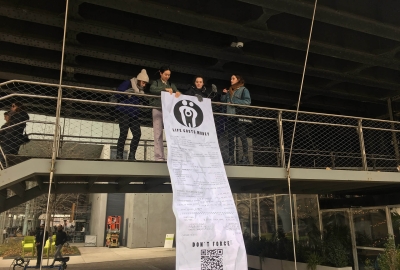
With a special focus on contemporary art and its social context, the Art + Education program positions the artist-teacher as cultural producer, intellectual, and activist able to work in schools, museums, community-based programs, alternative educational sites, and in the public realm.
Our alumni go on to teach and work in a variety of settings, such as public, private, charter, and international schools, museum education, and non-profit and community-based organizations. Additionally, alumni have gone on to create their own non-profit organizations, consult on curatorial projects and positions, as well as further study in Ph.D. programs in Art Ed or EdM.
Avalon Kenny, Initial Certification
Some kiddos call me “Bestie”, but I guess my official title is Art Teacher. I teach Intro to Studio Art and AP 2D and Drawing at Urban Assembly School for Collaborative Healthcare in Brooklyn. My students are 9th–12th graders, mostly from Cypress Hills, East New York, and Woodhaven. My Studio Art class focuses on various mediums, including drawing, painting, clay, found object sculpture, and printmaking. Every project allows for student voice and choice, and the themes are centered around their experiences.
The NYU Art Ed Initial Certification program has shaped everything I do. I never wanted to teach a traditional art class, but this program prepared me to meet challenges like balancing teaching art according to state standards AND individualizing and radicalizing my students' art class. After graduating from NYU, I am more prepared to tailor projects to individual students and find ways to make things as simple as two-point perspective empowering. An important idea I put into my practice as a teacher is self-advocacy. My students have a lot of power in my classroom and are encouraged to challenge me/the various modes of power in the classroom and what we look at.
My advice for new grad students: your first year will be really hard, and you won't really know what you're doing. Your grad program will be great (especially at NYU!), but you will learn more from sitting with your students and hearing about their lives than from any pedagogical course. Let your students talk to you about things that AREN'T related to school - try to talk to each kid about a non-school related topic as much as you can. Also, be patient! Be flexible! Make friends with your coworkers ASAP!!!
Emily Sciblia Wittenenstein, MA 2014

erin reid, Initial Certification
I’m an Artist Educator teaching Studio Art 1 to 10th graders and 2 mixed-grade electives at Harvest Collegiate High School, NYC. The NYU Art Education Initial Certification program both opened up and challenged my thinking as well as how I personally approach and connect to the work of teaching and creating. I was able to better link together the various ways I was moving through the world as an artist, a teacher, and an activist. This program helped me to feel more aligned with the work I’m setting out to do as an artist educator.
I think a lot about how I can better include student voice and leadership into my curriculum and classroom space. I want the art room to feel like a place where students can bring their full selves, interests, and ideas into the room. Otherwise, what I’m attempting to do in the classroom will risk being completely irrelevant to their lives. I aspire to have my students see art as a way to discover themselves and the world more deeply & critically.
The biggest support for me so far has been staying connected to a lot of other art educators. Being able to share resources, talk through curriculum and challenges, and sometimes just to vent is so essential. I’m a member of a public history group called the Close Friends Collective that is interested in preserving and uplifting queer history in NYC. With this group, I co-developed and facilitate a queer history walking tour of the Lower East Side in partnership with Henry Street Settlement and Bluestockings Cooperative Bookstore
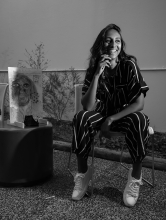
Rhea Creado, Art, Education, and Community Practice
I am a Sessional Academic at Queensland University of Technology (QUT), where I teach Visual Arts and Media Arts Education units. In addition to my teaching, I graduated with my Ph.D in December 2023 and was awarded the 'Outstanding Doctoral Thesis' recognition by my university. My work is deeply committed to amplifying marginalized voices and communities within the arts, with a particular emphasis on LGBTQIA+ histories and identities.
In addition to my academic pursuits, I have led research and projects that engage young people in learning about LGBTQIA+ histories and social justice issues. Growing up in environments that weren’t accepting of the LGBTQIA+ community fueled my passion for creating inclusive, supportive spaces for queer kids. I want to ensure that all children grow up feeling safe, loved, and included.
If you think of yourself as an out-of-the-box thinker, get ready because AECP is going to push you to critique and think about our world in ways you could never imagine! The AECP program has had a major influence on my work and research; it completely shifted the lens through which I view systemic injustices. I routinely find myself going back to my notes from my AECP classes, so I am very grateful for all that I have learned from the program and how it has impacted my career path, my research, and my arts practice. My recent grant-funded project was shaped by what I learned about race and racism in the AECP program.
Check out my TEDx talk on including LGBTQIA+ narratives in children's learning: Watch here.
Follow Rhea: Instagram
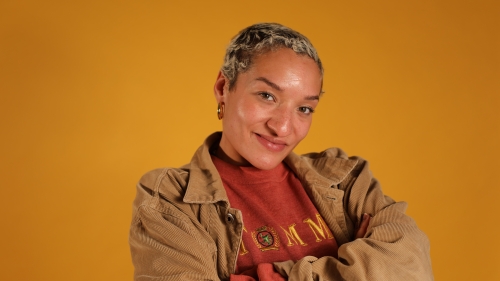
KT Kennedy (they/them), Art, Education, and Community Practice
I am the Youth & Community Organizer at the Assembly program at Recess Arts. I contribute to overall institutional development with a focus on Assembly, the artist-led diversion program and creative pathway reimagines an inclusive public for artists and system-impacted young people. As a program coordinator, I have relied on the intersectional teachings and contemporary approaches to art-making I learned in the AECP program. I use those approaches to bring together different educators, youth artists, practices, experiences, and mediums into our space.
My biggest advice for AECP students is to try an elective class you never thought you would sign up for! Take advantage of the learning opportunities that really put you outside of your comfort zone, that use different mediums and approaches to learning, and creative leadership. In the program, I learned from socially engaged artists and art projects from the past and interweaved my lived experience and approach to community organizing. The AECP program shaped my ideas about art, activism, and community, and I have developed a kind of art practice that contributes resources, care, and accountability to a larger ecosystem of artists. I now feel more comfortable and confident in my own art practice and role, which greatly benefits the larger Recess ecosystem.
Follow KT: Website
Dillon Paul, MA 2008
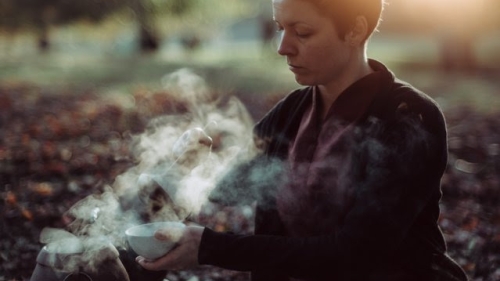
Erika Houle, Art, Education, and Community Practice
My official job titles are Director of Photography or Producer and co-founder, board member, and program director of Tea & Arts Culture (TAC). TAC is a non-profit organization that cultivates community and celebrates a variety of cultures through tea-centered events at community gardens, senior centers, food distribution centers, and spiritual centers. I helped guide our non-profit to serve a wider variety of communities and maintain accessible programming. My decision making process is influenced by the values and critical thinking I learned in the AECP program. The open mindedness and compassion with which I can provide support is influenced by the ways of seeing I encountered during the AECP program.
The program taught me how to bring critical pedagogy into every element of my work. When I was the chair of the Film/Video BFA program at Five Towns College I used what I learned from the AECP program to disassemble the traditional Film History class and turn it into a class about social movements through film history. The AECP program equipped me with the vocabulary and experience to discuss curricula in ways that helped me collaborate with colleagues to craft a forward thinking and self-reflective course. I use reflection to diligently perceive the subtle undercurrents of our impact on the world. Through Zen practice, tea community organizing, and a compassionate approach to education, I have found ways to maintain a sustainable and effective way of moving about the world. Activism doesn't all look the same. Street protests can be effective and so can the deep work of how you go about your day-to-day. Ask yourself, "What is the most skillful way to respond to this moment?" All problems in this world stem from matters of the heart.
Alumni Projects
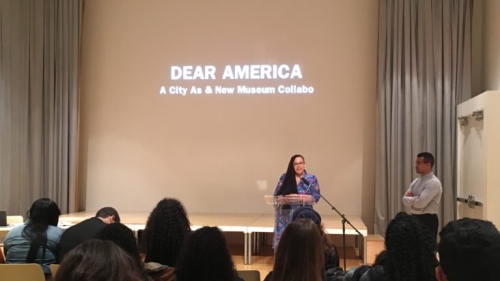
Tiffany Jones, Dear America Fellowship
The Dear America Fellowship is an internship experience for high school students designed by Artivist, City-As School Art Educator and NYU Art+Education program alumna Tiffany Lenoi Jones and artist Shaun Leonardo. The fellowship explores political art practices to inspire student Fellows as they develop and propose their own localized artivist project. Learn more about this project on our blog.
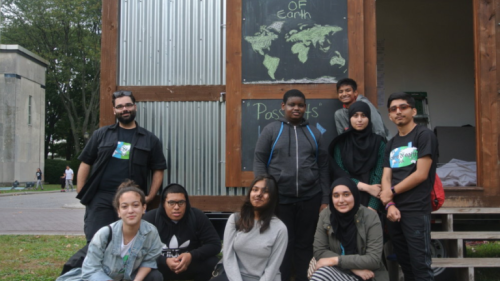
Nick Kozak, Citizens of Earth Project
Citizens of Earth is a social sculpture focusing on dialogue about immigration and ancestry stories in the United States. Citizens of Earth is enacted by Student Ambassadors from Manhattan Hunter Science High School who initiate conversations with the public, then invite participants to create an official passports for planet earth, complete with photo and official stamp. Citizens of Earth has been presented at The Queens Museum and Figment on Governor’s Island. Learn more about this project on our blog.
